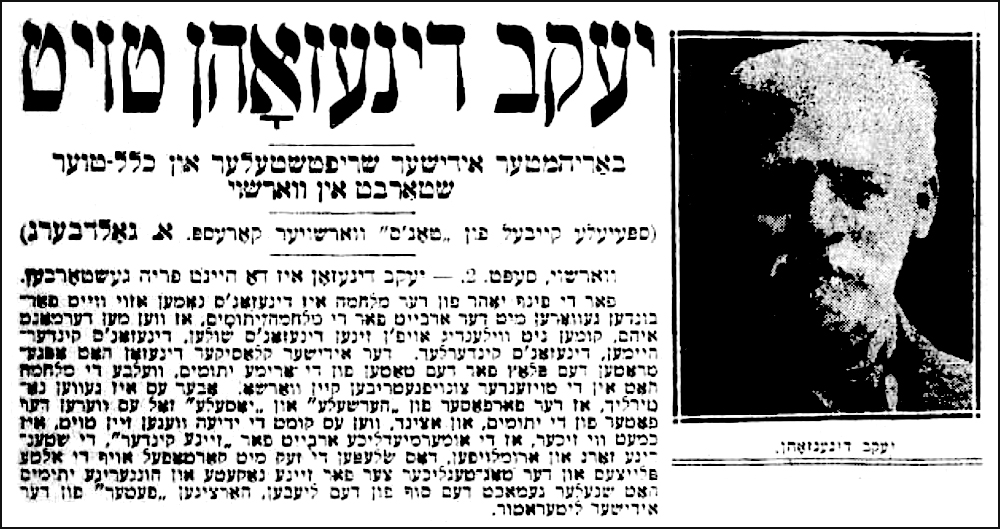Der Tog (The Day)
September 3, 1919, p. 1
New York, Philadelphia
Jacob Dinezon Dead
(Special cable from Tog’s Warsaw Corresp. A. Goldberg)
Warsaw, Sept. 2 — Jacob Dinezon died here early today.

During the five years of the war, Dinezon’s name has been so greatly linked to the work for the war orphans that when he is mentioned, Dinezon’s schools, Dinezon’s children’s homes, Dinezon’s little children come to mind involuntarily. The classic Yiddish writer Dinezon has given way to the father of the poor orphans whom the war drove to Warsaw in the thousands. But it was natural that the author of Hershele and Yosele should become the father of the orphans. And now, with the news of his death, it’s almost certain that the tireless labor for “his children,” the constant worry and running around, the hauling sacks of potatoes on his old shoulders, and the day-in and day-out grief for his naked and hungry orphans hastened the end for the beloved, kind “uncle” of Yiddish literature.
Jacob Dinezon’s first fame began in the year 1877 when his novel The Dark Young Man appeared. It made such an impression at the time that ten thousand copies were distributed. Later came his stories Hershele and Yosele, which drew tears from thousands of readers. The gentleness and kindness that led Dinezon to devote his life to small Jewish children filled his works, and although the number of books that he wrote during his lifetime is not especially large, Dinezon was still among the best-known Yiddish writers.
He was born in the year 1856 in Nay Zhager, Kovno province, to a poor but prestigious family. He was brought up in Mohilev, where he received his early and advanced education, befitting a young Maskil of that time. He began his literary activities as other Maskilim of that time with scientific articles to inform the public. However, he quickly switched to novels. The first was a large novel, For the Sins of the Fathers, that the censor did not permit to be published. Soon after he wrote The Dark Young Man, and that was the beginning of his fame.
Besides these works that have been mentioned, Dinezon wrote many stories and articles, translated several volumes of world and Jewish history, and so on. In the last years before the war, he published little of his own work. The great reading public remembered the beloved, kind Dinezon from his previous works, but for the circle of Yiddish writers, Dinezon was a close friend, a provider, an “uncle,” as he was called. He was the closest and most intimate friend of I. L. Peretz and those who felt like students and children in Peretz’s house came to “Uncle” Dinezon with all of their worries. He always had enough time for everyone.
It was as if Dinezon’s good nature was created for this role. He had no personal life of his own. He never married and died without heirs. He lived next door to his sister, and his residence was half there and half at Peretz’s. Everything that was good and kind in him, therefore, he gave to his spiritual children, and, in fact, his relationship to the capricious, impractical Peretz was also the relationship of a father to an adult son whom one knows very well and understands how to handle. Dinezon not only took care of Peretz’s affairs but the affairs of everyone from the literary family who turned to him as well.
For this reason, it had to be that when the war broke out and Jewish orphans began to flood impoverished Warsaw, Dinezon would take upon himself the role of Father of the Orphans, and he died doing this fatherly work.
His name will remain an account of another great spirit who fell during these terrible times that our people are experiencing because of his great love and devotion to his people.